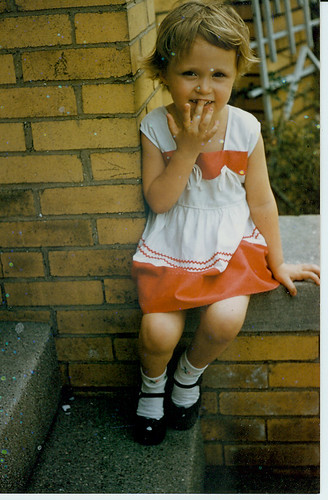How we piece together the world as small children isn’t as straightforward as we like to think. Back when he was a toddler, my son Tommy learned all 50 states via a wooden puzzle his grandparents gave him. He knew every state—its name and exactly where it went. But when he was in elementary school and had to learn the states in geography, none of that seemed familiar anymore, and he had to learn the states all over again, from scratch. Our childhood memories and what we learn as toddlers grow strangely jumbled over time. It’s like when we read bedtime stories to our children—after a few readings, they can supply missing words and whole sentences. But when my daughter Katie started insisting on reading her nighttime story by herself, she attacked each word individually with her blossoming reading skills, using an entirely different part of her brain than where those exact same words had been committed to memory.
When my big brother started elementary school, when I was almost four, I decided I wanted to learn how to read, too. I quickly learned my ABCs, and then started searching for simple words to read. My mother was overwhelmed with three children younger than me, and so I couldn’t pester her too much, but little by little I worked out the system for sounding out straightforward words such as my last name, Farley. I also picked up some common words it was trickier to sound out, like through and my first and middle names, Laura Lynn.
I was allowed to ride my tricycle on the sidewalk down to the corner, just two or three two-flat apartment buildings away. I could read my street name—Nelson—and STOP on the signs where the sidewalk ended. Every car license parked next to the curb said Land of Lincoln and ILLINOIS—my parents told me we lived in Illinois, though I didn’t understand that because I knew we lived in Chicago, and I couldn’t work out how one place could be inside another place. I also had no clue what Land of Lincoln meant, and when my dad showed me a penny with Abraham Lincoln on it, that hardly cleared things up. Other things I read didn’t seem to make any sense, either, such as the ingredients listed on food boxes and cans. But it was fun sounding out even what seemed like nonsense words.
We had a couple of Little Golden Books: Five Little Firemen and The Poky Little Puppy. My dad subscribed to The Chicago Tribune and Fire Fighter, his union magazine. Most of the newspaper was confusing, and except for some exciting stories and photo captions, so was Fire Fighter.
At some point, we got a set of the Illustrated Home Library Encyclopedias. I opened them at random now and then, and at some point when I was four or five, I decided to tackle them systematically, reading every word of every volume starting with Aardvark. I plowed through the two A volumes, perhaps understanding one tenth of one percent of what I read, and then started in on the first B volume. I got as far as B-i-r-d and stopped. That article, eight pages long, was utterly fascinating. I already loved birds—I was obsessed by the pigeons and sparrows around our apartment, and knew that my beloved grandmother, also named Laura, who had died when I was very small, had loved birds. I didn’t understand most of what was in the bird article, but figured if I read it over and over, little by little it would make more sense.
I was the only one in the family who was fascinated by our encyclopedias, but that B volume was the only one that was read over and over. Soon it had a visible crack in the spine and automatically opened to the Bird entry, which I eventually committed to memory. I remember a couple of times when we had company, my parents opened the encyclopedia to Bird and gave it to someone to follow along while I recited it word for word. Of course, no one had the patience to follow for more than a few sentences, so there’s no proof that I actually could recite all eight pages, but as I recall, I really could.
In my memory, that encyclopedia article is where I learned about the tiniest bird in the universe (the Bee Hummingbird of Cuba), the largest bird in the universe (the Ostrich), and what seemed like the most beautiful bird in the universe (the Resplendent Quetzal). For a while as a small child, I even became obsessed with the word resplendent, using it over and over in everyday conversation because the word itself seemed so resplendent.
A few weeks ago, I found a vintage copy of that B volume for sale on Amazon, opened it up, and there was my beloved Bird entry. But it seemed utterly unfamiliar, and nowhere were the Bee Hummingbird, Ostrich, or Resplendent Quetzal even mentioned! I must have learned about them from poring over copies of my Grandpa’s Readers Digest or from different volumes of the encyclopedia, but now I’ll never know for sure. As it turns out, something I’ve been talking about for decades turns out to be based on a false memory. Of course, the essentials remain true. I was fascinated by birds for as long as I can remember, and even if I don’t know how I learned it, the Bee Hummingbird remains the tiniest bird, the Ostrich the largest, and the Resplendent Quetzal truly resplendent. When it comes down to it, I guess that’s all that really matters.
 |
